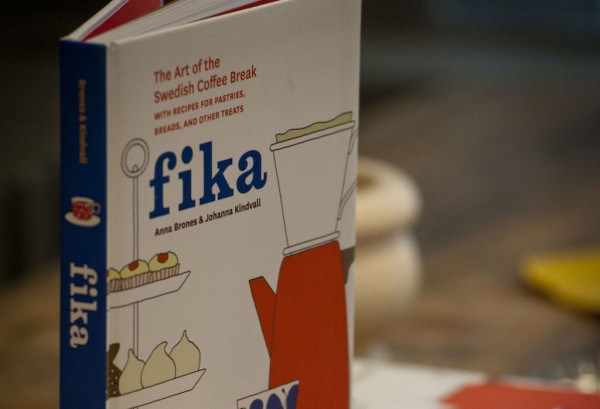In Fika: The Art of the Swedish Coffee Break, a new book co-authored by Anna Brones and Johanna Kindvall, coffee in the United States is associated with speed — it is something to be consumed early to engage the senses, or to be used for a quick pick-me-up.
Fika, a word that acts as both a verb and noun in Swedish, represents a contrary approach to coffee consumption. It is simply the pairing of coffee, or tea, and homemade baked goods, and savoring them with the people around you.
“At the end of the day, fika and this book is about taking a break having a coffee, eating something great with it,” Brones told Daily Coffee News shortly after the book’s publication. “Who doesn’t like that?”
For Brones and Kindvall, the book represents something of a Swedish soul connection. Both credit the scratch baking of their Swedish mothers as inspiration. Brones, who is American-born and living in Paris, says family members in Sweden were obsessively sharing links to a Huffington Post piece on the book that was reposted in the native language.
“I think it is hilarious — they wouldn’t need the book in Sweden,” says Brones. “In Sweden, [fika] is just kind of a normal thing that you do.”
The book contains recipes for dozens of traditional Swedish homemade tarts, breads, tortes, cakes, cookies, buns and more. There are also a few modern takes on Swedish baked goods, which are framed in the book by chapters such as “The Outdoor Season” and “Modern-Day Fika.”
A brief history of Swedish coffee and coffee culture lead into the recipe sections. Recipes themselves are put in cultural and culinary context: How might this fruitcake be an improvement over the hard, dry cakes that make Americans shudder? Or, What are the traditional baked goods in a traditional Julaftong (Christmas Eve spread)? There is also some wonderful explication of Swedish language. One could most likely speak fluently in a Swedish home kitchen if her or she were to commit the pages to memory.
Brones and Kindvall pitched a hard manuscript of the book to Berkeley, Calif.-based 10 Speed Press, associated with a division of Random House, three years ago. They got an immediate green light, and Fika was officially released last month. Some glowing reviews from the likes of the New York Times T Magazine, Cool Hunting and Paste Magazine have propelled the book to early success.
“Part of the reason we did the proposal was because, even at that time, Scandinavian food culture was just coming into fashion,” Brones says, citing the growing Fika coffee chain in New York, as well as other independent single shops that borrow the name in Sydney, London and Seoul. “I think there has been a kind of reattachment to the word.”
In the book publishing world, timing is always a gamble. “You’d probably have a hard time pitching a book on kale smoothies and mason jars right now,” says Brones, who maintains Foodie Underground, writes about food for numerous publications, and dove into coffee writing through her work with Sprudge.
Asked whether she’s tired of the word fika after three years of pitching, writing, editing and promoting, Brones says, “No, I love fika. Fika is the best thing ever.”
Brones and Kindvall are currently in the midst of a mini book tour, including upcoming signing events in New York, Seattle, Portland and London. Visit Brones’ Foodie Underground for the latest.
Nick Brown
Nick Brown is the editor of Daily Coffee News by Roast Magazine.







Comment